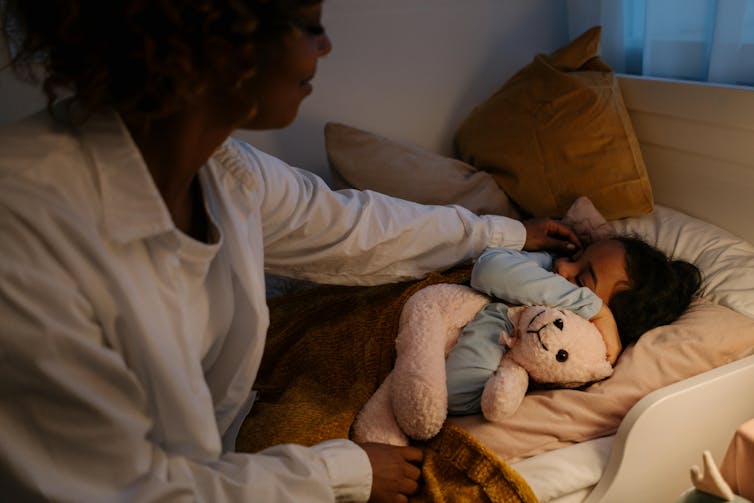
Expecting another child can be both exciting and nerve-racking. Many parents feel more confident the second (or third) time around as they have already experienced the birthing process, the challenges of caring for a newborn and the inevitable sleep deprivation.
However, there’s also a new layer of complexity around balancing the needs of an older child or children while caring for a newborn. Research has found that for most parents, balancing the needs of their first-born with those of a new baby can feel overwhelming.
As developmental and clinical psychologists, we hope to provide information and resources for parents on how they can cope with this transition and help prepare their older children to adjust.
No one’s 20s and 30s look the same. You might be saving for a mortgage or just struggling to pay rent. You could be swiping dating apps, or trying to understand child care. No matter your current challenges, our Quarter Life series has articles to share in the group chat, or just to remind you that you’re not alone.
Table of Contents
How children react
Children tend to show a variety of reactions when welcoming a new sibling. Some may feel very excited and embrace their sibling with a lot of affection, while others may experience mild, moderate or intense feelings of jealousy. Often, when a child feels jealous, it can lead to acting-out behaviours such as temper tantrums or crying. Many children also show a mixture of these scenarios, feeling both curious and unsure.
An older sibling’s age can play a role in how smoothly they adjust to a new sibling. Younger children aged two to three naturally have more difficulty with emotional regulation, which may be heightened when a new sibling arrives. This can result in more disruptive reactions, like hitting or clinging to caregivers.
Children who are four or five years old tend to have a better understanding of different perspectives and often try to help their sibling when they cry. However, these children are also more likely to tease and test boundaries with their new siblings.
Seeking attention
Psychologists consistently agree that welcoming a new sibling is a major transition for most children. During this time, it’s common for older siblings to act out and seek out extra attention.
They may also try to test limits and boundaries more frequently, have trouble following directions, throw more temper tantrums and even experience new sleep problems and an increase in nighttime or toilet training accidents.
We want to assure parents that these behaviours are a normal part of the adjustment process.
How should parents feel?
Parents report they often feel guilty and upset when they cannot spend as much time with their older children once a new baby arrives.
A study conducted with mothers found that they often have difficulty handling their older child’s changes in behaviour during this transition.
Research with mothers in roles as primary caregivers found that they feel more satisfied and less overwhelmed when they share responsibilities like child care and household chores more evenly with a partner. Primary caregivers are less stressed, depressed, anxious, angry and fatigued when they feel they have a good support system during this challenging time, both within and beyond the family.
Helping parents support older children
Below we offer a list of tips to help parents navigate the transition to having more than one child in the family.
1. Expect some challenges — it’s part of the process. It is normal for your older child to show some behaviours you will find challenging during this transition. Rather than seeing these as a problem, we recommend viewing them as a sign that your child is adjusting to a big change.
2. Lean on your social support network. Parenting is hectic, especially with a newborn, and more than one child. We recommend turning to your family and friends when you need them, and asking for help like babysitting the older child, dropping off or cooking a meal or just listening when you need to vent. Family and friends often don’t know how to help unless we ask them directly, so try to communicate what you need to get the help you are looking for.
3. Explore community resources. In many communities, there are drop-in spaces for parents and young children. For example, throughout Ontario the EarlyON Child and Family Centres offer services and resources for families and children from birth to six years old. Local libraries (like the Calgary Public Library) also host free family story times and other events for child enrichment and parent socialization.
4. Share the load. If you have a co-parent, it is also important to communicate to them what you need to achieve what feels like a more equitable division of labour. Shared child care and household chores reduces stress for the whole family.
5. Try to make time for yourself. It might seem impossible at times, but taking time for yourself is essential for your well-being. This could include a short nap, shower, a walk or even reading a few pages. Though we understand that alone time is sometimes impossible, try to rest when your child is resting by lying down (even if not sleeping) or some light reading in a cozy nook. Even a short period of time can be rejuvenating.

(Pexels/Cottonbro)
Ways parents can help promote their children’s well-being:
1. Create special one-on-one moments. Try to set aside small pockets of time for your older children. This could include a quick game or play session together, a bedtime story or a short trip to the park. This time can help them feel reassured and loved during a big adjustment period.
Read more:
7 favourite books for connecting with your preschooler
2. Have your child spend time with children their own age. Try to arrange play dates with friends for your older children, ideally at their friend’s house so you can get a break. It is important for children to have time to play and socialize with children around their own age. This helps children develop better relationship skills like sharing and understanding others’ emotions and perspectives.
3. Involve your older child. If they show interest in their new sibling, you can encourage your older child to help with small tasks, like singing to the baby or bringing over a baby toy. This fosters a sense of involvement and can foster sibling bonding.
4. Choose your battles. If your older child acts out to get your attention, for example, if they throw their toys, instead of focusing too much on stopping that behaviour, try to let it go when possible. The best strategy is to redirect them to an activity you know they enjoy or can succeed at and give them positive attention within that activity. The goal is to try to “catch them being good” with positive reinforcement. This helps prevent negative feedback loops and can reduce attention-seeking misbehaviour (because they are getting the positive attention they need).
Relationships between siblings are constantly changing as they grow, but they are among the most important and long-lasting relationships in life.
Helping your older children navigate the new sibling transition will help set the stage for a positive sibling relationship across childhood and beyond.
![]()
Marissa Nivison receives funding from the Social Sciences and Humanities Research Council of Canada.
Sheri Madigan receives funding from the Social Sciences and Humanities Research Council, the Canadian Institutes of Health Research, the Alberta Children’s Hospital Foundation, an anonymous donor, and the Canada Research Chairs program.























